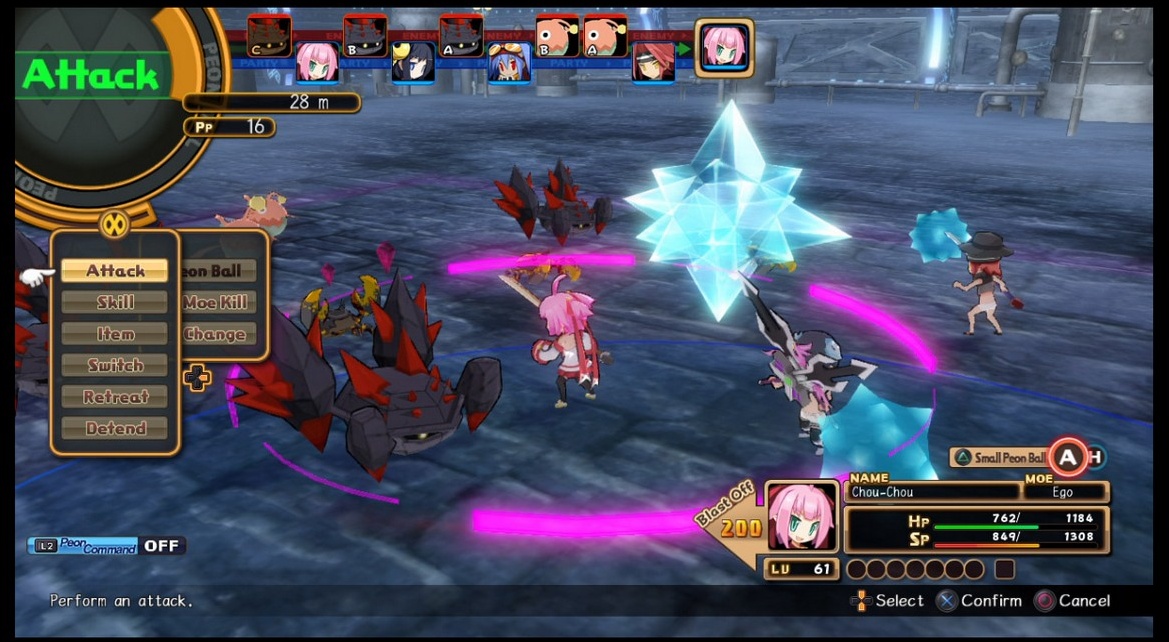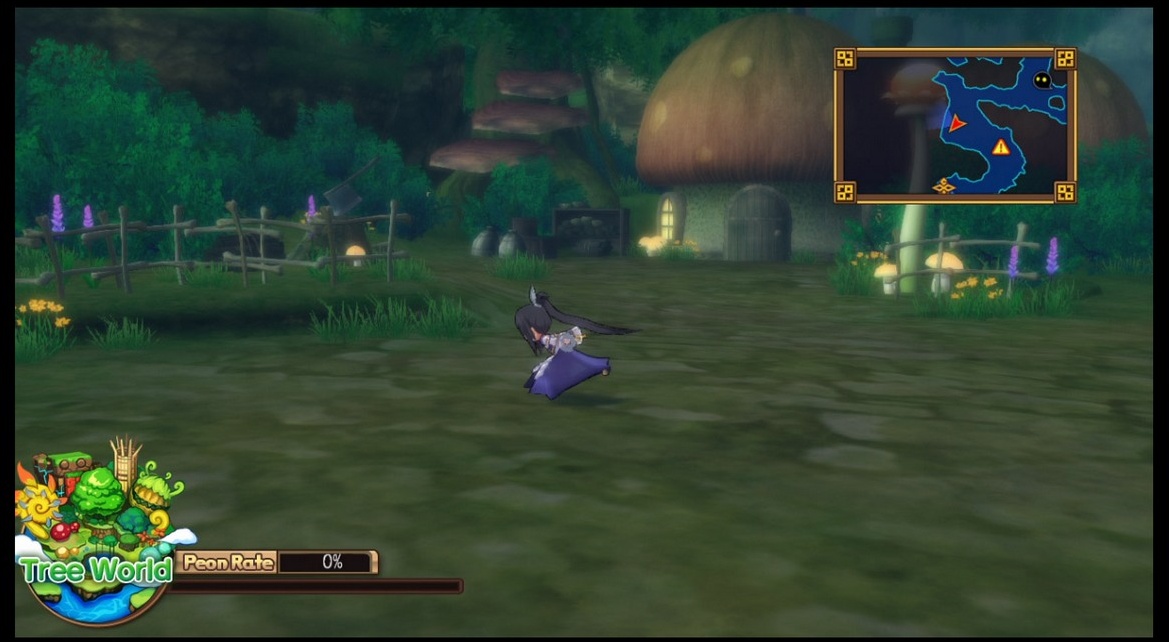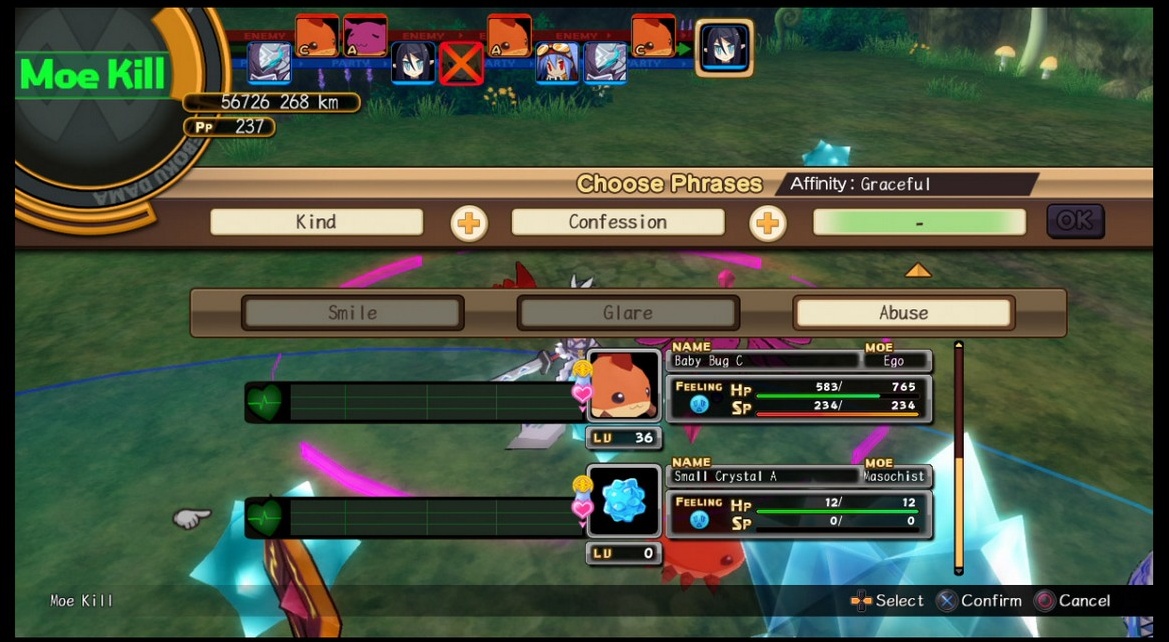There's a lot to appreciate about the anime-style trappings seen in many Japanese role-playing games. The influence of Japan's rich history of cartoon and comic art can translate to colorful environments, outlandish characters, and even some offbeat humor. Mugen Souls is one such RPG. But while it wholeheartedly embraces the anime-loving, game-marathoning otaku culture that inspired it, Mugen Souls seems to have completely forgotten to be a good game first and foremost.

The premise of Mugen Souls is novel: rather than saving the world from imminent destruction, antiheroine Chou-Chou wants to turn every being in the seven corners of the universe into her loyal servant. She has a knack for getting people to surrender to her will, thanks to her unique ability to pander exactly to anyone's taste in character stereotypes. She also has a commandeered spaceship and an ever-growing army of subservient lackeys under her rule.
The character designs are cute and appealing (if a little uncomfortable at times--some of the characters look quite young), and the theme of conquering the universe with your egotistical charm is inherently appealing. But the problems with Mugen Souls emerge from the get-go. Chou-Chou's one-note appeal fades quickly as she and the supporting cast fail to undergo any satisfying character development, even after Chou-Chou displays her ability to assume seven different personality types.
The one-dimensional characters might be forgiven if their interactions were as funny as the game seems to think they are. Alas, attempts at humorous exchanges between the characters fall flat with resounding thuds, save for a few cute digs at video gaming conventions. There's little to the story besides the supposed humor, so when the funny fails, every lengthy dialogue exchange turns into an excruciating experience.
Solid gameplay can rescue an RPG with a weak story, but the gameplay of Mugen Souls is a superficially complex mess of disparate mechanics that fail to gel into anything cohesive. Chou-Chou, her seven personalities, and her servants traverse small, sloppily designed, uninteresting overworld areas, which chug along at incomprehensibly low frame rates, despite their simplistic visuals and object models, unless you lower your display resolution to 720p. There are mobs of endlessly respawning enemies on each map, and though you can see them before you fight, they tend to move so quickly that avoiding them (or slashing Chou-Chou's weapon fast enough to enter battle with an advantage) is extremely difficult once they notice your presence.

When you enter a fight, there are lots of options available to you, all of which are explained only one time through poorly presented tutorials--which then become completely inaccessible should you want to review anything you've learned. You've got a fairly standard RPG array of basic attacks, special skills, and items to use, as well as a positioning-based combat system that lets your party and the enemies run around the field. Characters can also perform team-up attacks that have some amusing animations, but they become so drawn out that you are quickly tempted to turn off the "battle animations" option.
Chou-Chou has access to some unique skills, however. She can shift into one of her seven personalities mid-combat, which changes her affinities toward special attacks; rather than being based on traditional RPG elements like fire, wind, and water, skill and character affiliations are based on personality traits like bipolar, graceful, and sadist. Chou-Chou also has an ability called the "moé kill": by pandering to enemies' particular tastes, she can transform them into willing peons, who then power up her spaceship. This is accomplished by trying to match a series of three action selections to an enemy's taste and current mood. Make the enemy happy, and you are rewarded; pick the wrong choices, and you get an agitated, more powerful foe to contend with.
As novel as they may sound, moé kills turn into an exercise in tedium. Since the moods of enemies are constantly changing--as are your choices for moé kill actions--it's hard to get any sort of consistent reaction from them, even when you've matched their type perfectly. Choices that might seem logical given a foe's current mood can inexplicably make them upset. It also takes a very long time to complete moé kills on certain foes, and since Chou-Chou is the only one who can initiate them, you waste time having everyone else onfield defend while you hope you're making the right choices to win a foe over. If you fail, prepare for an even longer fight.
Other elements are thrown into the combat system with little regard as to how they interact with each other or add anything meaningful to the gameplay. Special attacks can be imbued with a "blast off" effect that sends enemies ricocheting off each other and onfield objects, which looks pretty cool but never does the sort of damage you'd expect. Hovering crystals offer various ranged effects and rewards when broken, but can be targeted only by the aforementioned blast off attacks and moé kills. An object called the "peon ball" amasses power as the battle drags on and can be summoned to deal damage to every foe onscreen, but its potential to backfire goes up in proportion to the health of your party, making it dangerous in the sort of last-ditch situations where you'd logically want to use it most.
You can play through battles trying to follow a list of specific orders for more potential winnings, which are rarely substantial. Ultimately, even when you try to use all the crazy options the game gives you for fighting, you usually wind up feeling like your effort didn't yield adequate reward. It's easier to try to ignore enemies on the field (or mash fight through the battles) and instead build up levels and collect rewards in the optional Mugen Field, a series of random battles with handicaps that can deliver bigger experience point yields and rewards than normal.
Conquering the territories you need to proceed is yet another ill-conceived gameplay element. Chou-Chou needs to go to specific places on the field (which are only vaguely hinted at) and assert her dominance in one of three ways: by paying a certain amount of money, by beating a certain number of enemies, or by performing a successful moé kill. All of these involve guesswork: it's never stated exactly how much money or how many defeated foes you need to proceed, so if you don't have enough, you have to grind until you think you do and try again. Failing these attempts sends you into combat, which only adds to the annoyance.

Finally, there are the spaceship battles, which pit Chou-Chou's warship against that of a single foe. These battles play out like an augmented form of a rock-paper-scissors fight, with certain choices overpowering others (for example, pierce attacks beat defensive barriers but lose out to fast missile strikes). As Chou-Chou recruits peons, the ship grows stronger, and more attack and defensive options open. But these options are almost unnecessary, because most of these battles are easy. There is always a hint displayed as to what action the opponent will take, and after you figure out exactly which attacks the hints correlate to, space dogfights become a breeze…which further defeats the point of putting a lot of effort into standard combat.
There are a lot of character-building and gear customization options--all of which seem to involve a separate point currency--but it's just more empty complexity layered on a game that's weak at its core. "Overwhelming" is a word seen often in Mugen Souls' vocabulary, and it's presented in a positive light. Ironically, the game is blissfully unaware that its faux depth is overwhelming in bad ways: the gameplay is ill-explained, none of the systems supplement each other, and the game is shrill and unrewarding. Compared to many other Japanese RPGs for the PlayStation 3, Mugen Souls is underwhelming.
